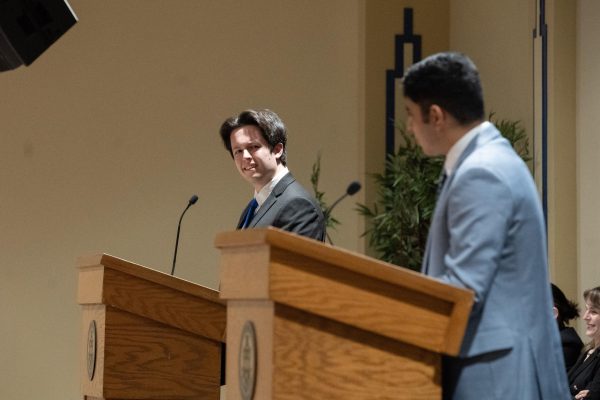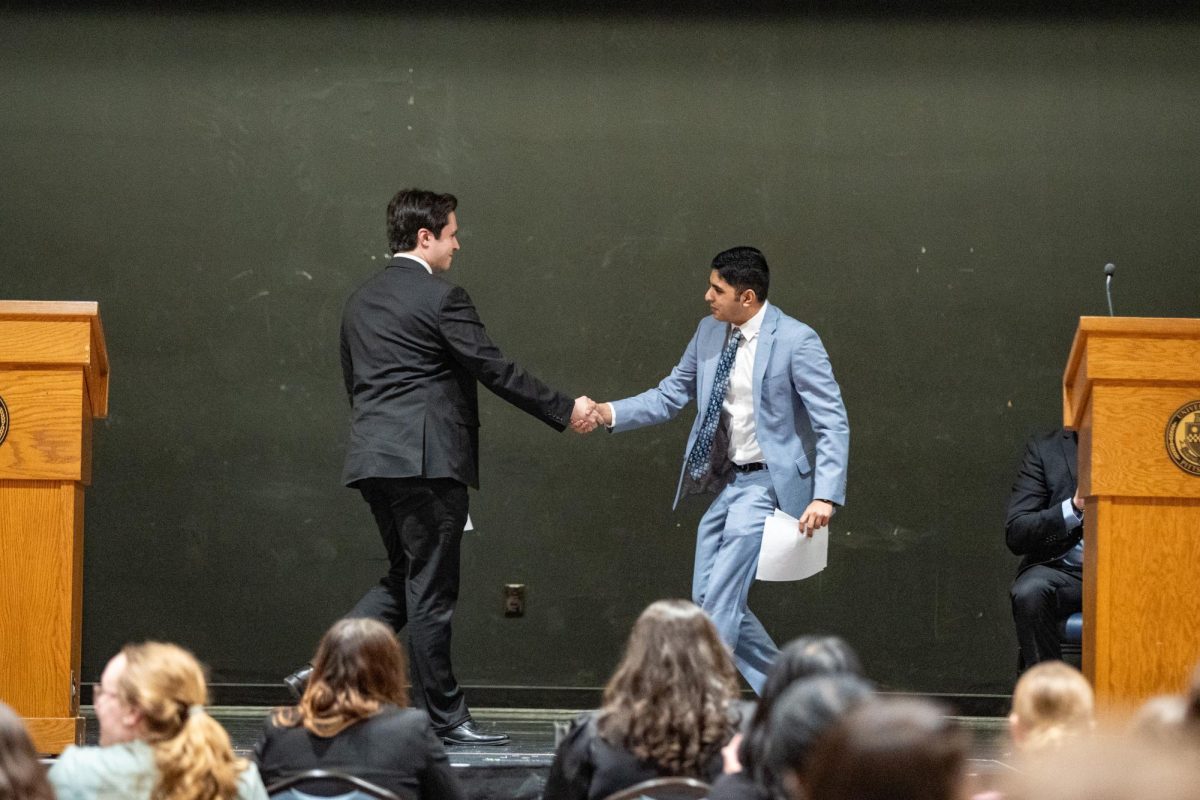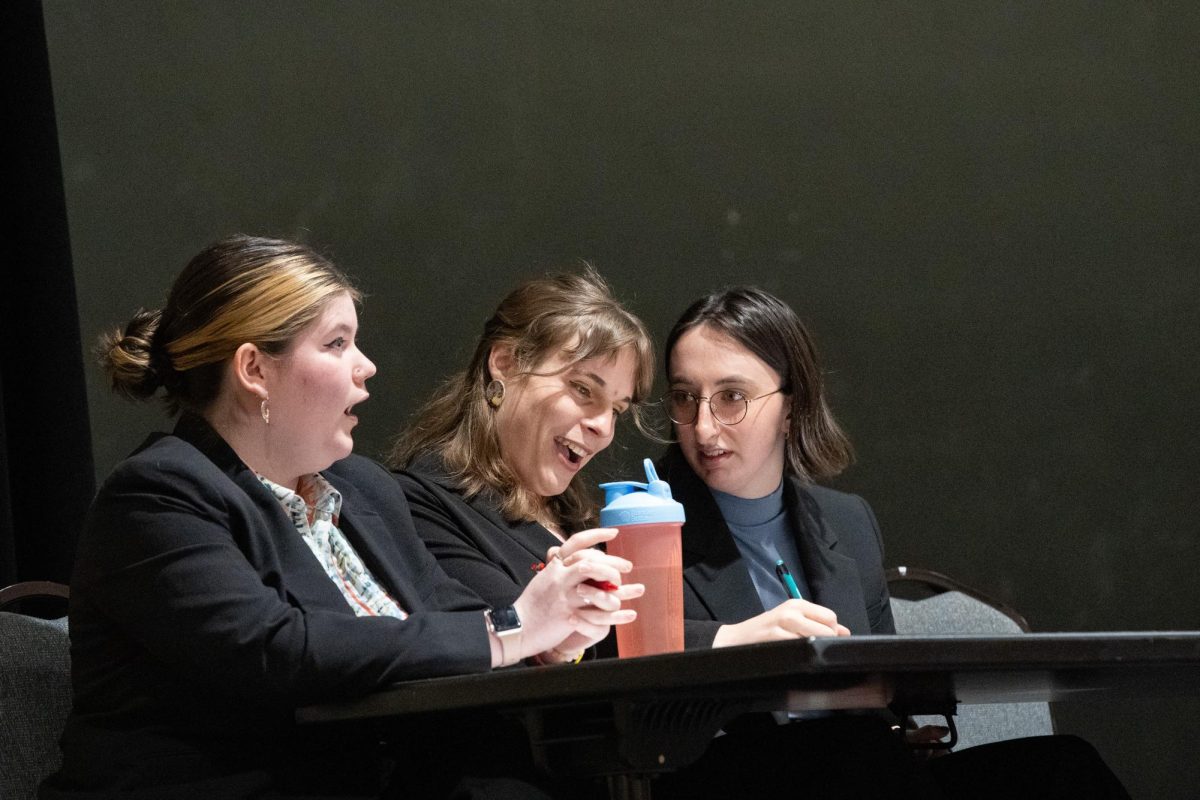Covering topics from immigration policy to abortion access, partisan student organization members took to the stage and argued for their beliefs Monday evening.
Around 100 students gathered to watch Pitt’s College Democrats and College Republicans debate a variety of political topics in the William Pitt Union Assembly Room on Monday.
The debate, hosted by Bridge Pittsburgh, marked the third annual debate between the two partisan organizations. Alex Weaver, president of Bridge Pittsburgh, emphasized the importance of discussion between both ends of the political spectrum in his opening remarks.
“We’re not here tonight because civil discourse is necessarily easy or comfortable or fun,” Weaver said. “It can be hard to discuss politics with those we disagree with because it can be hard to understand why others may disagree with us.”
The debaters had 15 minutes to argue on four pre-selected topics — immigration, LGBTQIA+ rights, the Department of Government Efficiency and abortion access — before taking questions submitted by students.
The discussion around immigration largely centered on the recent deportations of pro- Palestinian students, who are in the United States on visas. Both sides also expressed interest in strengthening pathways to legally immigrate into the United States.
Patrick Francis, a first-year law student and Pitt Democrats member, said someone’s stance on Israel and Palestine is not plausible grounds to deport them.
Sumay Sethia, a College Republicans member and undeclared first-year, said he thinks that immigration should be “beneficial for American society.”
“There is not a single number that can describe the optimal number of immigration,” Sethia said. “Whatever that number may be, the people coming in need to be vetted properly. They cannot come here illegally.”
On the topic of LGBTQIA+ rights, debaters focused on gender-affirming care for trans youth. Olivia Pinocci-Wrightsman, vice president of College Democrats and a junior political science major, showed support for trans health care and said “trans rights are not up for debate.”
Julia Cassidy, president of College Republicans and a sophomore political science and economics major, spoke about trans people playing sports and criticized research regarding the effectiveness of gender-affirming care.
“I don’t care if a biological man wants to identify as a woman,” Cassidy said. “But it infringes on my rights when trans female athletes win 900 medals across 24 sports.”

While speaking on the newly established Department of Government Efficiency, debaters’ comments revolved around problems with Social Security. Kasey Brown, secretary of College Democrats and a senior math and economics major, said she feels that DOGE is currently not making the government more efficient.
“Social Security has never missed a payment for 80 years, and now people are being erroneously declared debt because his goons, like Big Balls, don’t understand the government programming in the system,” Brown said. “They are making Social Security completely dysfunctional so they can scrap it all together. It’s censorship that is thinly failed as efficiency.”
Dylan Mitchell, vice president of College Republicans and a senior history and law, criminal justice and society major, countered by proposing an investigation into Social Security.
“Social Security is on a careening path towards complete bankruptcy,” Mitchell said. “We won’t actually see social security and nobody in this room is old enough that they’ll actually get to see a social security check, unless there are fundamental reforms.”
For the final topic of abortion, the debate moderator asked both sides if they believe states with codified abortion laws should restrict abortion access to only state residents. Jenna Smith, recruitment chair for College Republicans and a psychology and law, criminal justice and society major, said she believes a pro-life culture will “empower women.”
“The goal is not punishment,” Smith said. “It’s a society where life is embraced, where women are truly empowered, and where the most vulnerable among us are given a chance at a culture of life.”
Breanne Francis, a College Democrats member and an economics and political science major, said she believes the decision to get an abortion should be between a woman and her doctor.
“An overwhelming majority of Americans identify as pro-choice,” Breanne Francis said. “Americans support abortion being legal for women to make the choices they feel are necessary for themselves, with their doctors, and not the government.”
The topic of the United States’ role in the Israel-Palestine conflict arose in the audience question section of the debate. With Republicans in the majority in Congress, Patrick Francis said it is up to the GOP to resolve tensions.
“I think it’s wrong to go on Truth Social and to post Trump Gaza videos and AI edits showing how we’re going to throw out every Palestinian from the Gaza Strip and instead create a Trump Tower there,” Patrick Francis said. “What we as Democrats stand for is a ceasefire and a stoppage of all offensive weapons to Israel in order to secure a two-state solution.”

Sethia showed support for Israel and said killing civilians is necessary in order to “ensure atrocities don’t happen again.”
“Israel is our greatest ally in the Middle East and in the entire world,” Sethia said. “Israel was attacked, so of course they will retaliate. That is common sense. Any war that has happened in history has had civilian deaths.”
To conclude the debate, both sides explained how students can be involved with their clubs. Patrick Francis argued local politics are equally important.
“Local elections matter,” Francis said. “We have, of course, our mayor coming up, and that’ll determine many different policy choices for the city of Pittsburgh in relation to housing, corruption, infrastructure, and so that’s where we really are going to move forward.”
Cassidy agreed that local elections are important.
“Some of the issues that people really care about can be influenced by voting in your local election,” Cassidy said. “For example, abortion is an issue that’s up to the states right now, and your smaller, more condensed elections are where your voice is going to be heard.”
Primary elections in Allegheny County are on May 20, and polling places will be open from 7 a.m. to 8 p.m.



